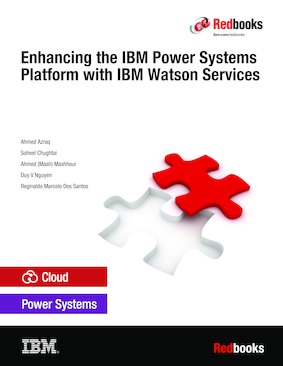Abstract
This IBM® Redbooks® publication provides an introduction to the IBM POWER® processor architecture. It describes the IBM POWER processor and IBM Power Systems™ servers, highlighting the advantages and benefits of IBM Power Systems servers, IBM AIX®, IBM i, and Linux on Power.
This publication showcases typical business scenarios that are powered by Power Systems servers. It provides an introduction to the artificial intelligence (AI) capabilities that IBM Watson® services enable, and how these AI capabilities can be augmented in existing applications by using an agile approach to embed intelligence into every operational process. For each use case, the business benefits of adding Watson services are detailed.
This publication gives an overview about each Watson service, and how each one is commonly used in real business scenarios. It gives an introduction to the Watson API explorer, which you can use to try the application programming interfaces (APIs) and their capabilities. The Watson services are positioned against the machine learning capabilities of IBM PowerAI.
In this publication, you have a guide about how to set up a development environment on Power Systems servers, a sample code implementation of one of the business cases, and a description of preferred practices to move any application that you develop into production.
This publication is intended for technical professionals who are interested in learning about or implementing IBM Watson services on AIX, IBM i, and Linux.
Table of Contents
Chapter 1. Introduction to IBM Power Systems servers
Chapter 2. Introduction to IBM Watson services and the Representational State Transfer architecture
Chapter 3. Typical IBM Power Systems applications
Chapter 4. Setting up the development environment
Chapter 5. Deploying a sample Node.js application that integrates with IBM Watson services
Chapter 6. Use case implementation for IBM AIX and Linux on Power
Chapter 7. Use case implementation for IBM i
Chapter 8. Deploying the application into production
Appendix A. Setup and configuration of the IBM DB2 server
Appendix B. Additional material
